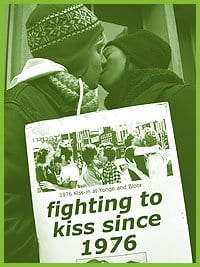A violent attack on a queer couple in Montreal reignited the spirit of grassroots activism in Toronto last weekend, as between 75 and 100 people showed up at the corner of Yonge and Bloor for a good old-fashioned kiss-in.
“I was shocked – it’s the 21st century. We’re in Canada,” said one protestor between kisses. “You don’t expect this to happen.” She added that she and her partner moved to Canada from Texas because they thought it was more “liberal and accepting” and because of homophobic workplace harassment after President George Bush’s election.
The widespread disbelief over the attack shows the power of the myth that queers have got it made in Canada, or at least in major urban centres. Such acts of homophobic violence contradict the recent gains in queer legal rights and inclusion in popular culture.
But at the same time statistics from the Gay And Lesbian Bashing Hotline show an increase of 12 per- cent in reports of bashing incidents between 2002 and ’03, with a notable rise after the Ontario Court Of Appeal decision to allow same-sex marriage.
“Bashers are still out there,” says Howard Shulman, coordinator of the 519 Community Centre’s Anti-Violence Program, adding that he expects to see a further rise in 2004 statistics. He says that every gain brings with it a “higher risk potential. When attention to the queer community increases, queer individuals are actually more at risk.”
The Jan 29 protest was a response to a bashing that took place in Montreal the previous week. On Jan 21 at approximately 4pm, Brook Morrison and Joelle Perras stopped to share a kiss at the corner of Mont-Royal and St Denis. Someone – neither woman saw who – hit the back of Morrison’s head with such force that the skin on her forehead split where she slammed against Perras’s face, leaving Perras with extensive facial bruising and a broken nose.
A criminal report has been filed, but chances of charges being laid are nonexistent without a bystander to identify the assailant. No eyewitnesses have come forward.
The two women organized a kiss-in for Jan 28 on the same corner at which they were attacked. Dozens of couples, mostly women, came out to show their support.
For Lindsay Shane, a friend of the couple, the bashing hit close to home. When she couldn’t attend the Montreal rally, she and friend Pam Johnson organized a solidarity kiss-in in Toronto.
The choice of location was anything but random. On Jul 17, 1976 Yonge and Bloor was the site of a kiss-in organized by the now-defunct Gay Alliance Towards Equality after two men were found guilty of committing an indecent act for kissing on Bloor St.
“We have a long way to go to liberation,” said Anna Willats, an antiviolence activist as she called on the cheering crowd to “interrupt the queer bashings, the racism, the anti-poverty [harassment] in the streets, at work, anywhere.”
Echoing this, another protester challenged the queer community to get political. “I am tired of our community being lazy about our rights. We deserve to kiss wherever we want without always having fear in the back of our minds.”
* The Gay And Lesbian Bashing Hotline Line is at (416) 392-6878 ext 337.

 Why you can trust Xtra
Why you can trust Xtra


